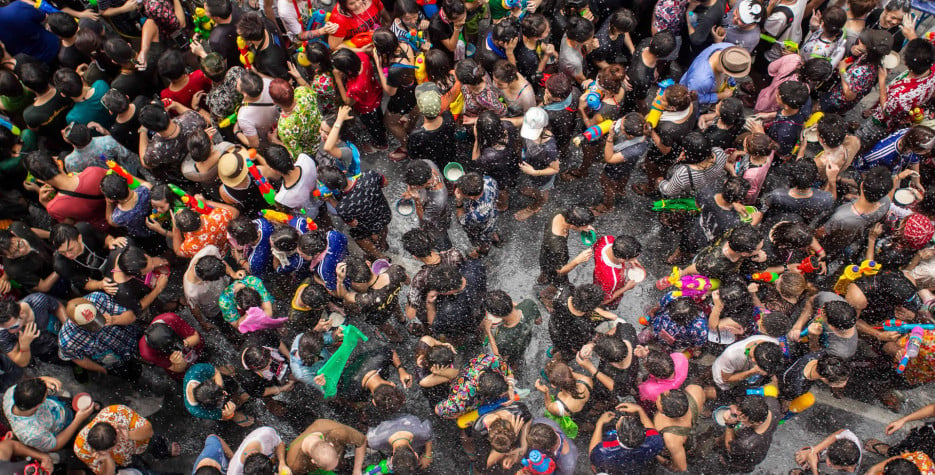When is Songkran?
The Songkran festival is the traditional Thai New Year's Day and is celebrated from April 13th to April 15th.
History of Songkran
The word Songkran is from the Sanskrit language and means the passage of the sun from one sign of the Zodiac to another. That means there are twelve Songkrans each year, but the significance of this Songkran (sometimes called Major Songkran to distinguish it from the others) is when the sun enters the sign of Aries the Ram. The particular event was also closely related to the Vernal Equinox.
Celebrating New Year at the time of the Vernal Equinox was very common in the past. The Songkran celebration is similar to those of the Indian Holi Festival, the Chinese Ching Ming, and the Christian Festival of Easter. Indeed, April Fool's Day probably originated as mocking those who didn't accept the switch of New Year from April to January in France in the Sixteenth Century.
Did you know?
In ancient times, the dates of Songkran and the Vernal Equinox would have been closer, but they have shifted due to an effect called procession, where the Earth wobbles on its axis over a 25,000 year period.
The date was originally set by astrological calculations, but it is now fixed on 13 April. The festival may be extended if some of the celebrations fall over a weekend.
In Thailand, New Year is now officially celebrated on January 1st, in line with almost all other countries. Songkran was the official New Year until 1888, when it was switched to a fixed date of April 1st. It wasn't until 1940, that this date was then shifted to January 1st.
In December 2023 “Songkran in Thailand, Traditional Thai New Year Festival” was included in the Representative List of the Intangible Cultural Heritage of Humanity by the United Nations Educational, Scientific and Cultural Organisation (UNESCO).
The announcement was made on December 6th 2023, during the 18th Session of the Intergovernmental Committee for the Safeguarding of the Intangible Cultural Heritage, being held in Kasane, Botswana.
Making a splash - celebrating Songkran
The most famous aspect of the Songkran celebrations is the throwing of water. The custom originates from spring cleaning aspect of Songkran. Part of the ritual was the cleaning of images of Buddha. Using the 'blessed' water that cleaned the images to soak other people is seen as a way of paying respect and bring good fortune.
It also doesn't hurt that April is the hottest part of the year in Thailand, so being soaked is a refreshing escape from the heat and humidity.
Nowadays Thais will walk the streets having 'water fights' using containers of water or water guns, or stand at the side of roads with a hose and soak anyone who passes by.
You may also get covered in chalk, a custom originating from the chalk used by monks to mark blessings. This combination of water and powder is almost identical to the celebrations of Holi, and indeed, it may be that the customs originated in India as certainly Songkran is celebrated more widely and longer in the Northern part of Thailand.
Even more interesting is that the custom of water fights pops up in a distant place at the same time of year. Dyngus Day is celebrated on Easter Monday in Poland, and on the Monday the custom is that boys get to soak girls with water, but on Tuesday, the girls get to throw crockery at the boys - again the water and powder combination.
As mentioned, Songkran is a Spring Cleaning Day, both physically and spiritually. On the physical side, in addition to cleaning other customs are that anything old and useless must be thrown away or else it will bring bad luck to the owner. On the spiritual side, some people make New Year resolutions.
Most banks and government offices will be closed for the duration of the festival. Many currency exchange booths will remain open.
The Three Days of Songkran
The first day of the Songkran festival sees people clean their homes and public places like temples and schools to get rid of any bad luck from the previous year and ready them for the new year. Another main activity is Song Nam Phra, a ritual that involves the pouring of scented water onto a temple’s sacred Buddha images. It is important to note the water (traditionally scented with a perfume called Nam Ob) is poured not onto the head of the image, but rather the torso and body.
The second day is known as Wan Nao and is when people prepare food and offerings to be given to monks and temples the following day. It is also a time to pay respect to elders, and young people prepare rose and jasmine water as well as Nam Op, scented water, with which to wash their parents' feet in a ceremony called Rot Nam Dam Hua. The parents in return give the children their blessings, typically along with a jasmine floral garland. Many people will also make sand stupas – known as Chedi Sai – in the grounds of their local temple as a kind of personal pagoda and a fun family way to make a spiritual offering.
The third day of Songkran is known as Wan Payawan and people typically start the day by visiting their local temple to present food and clothing to the monks, who then pray for them. They also partake in other rituals believed to bring good luck for the New Year.


